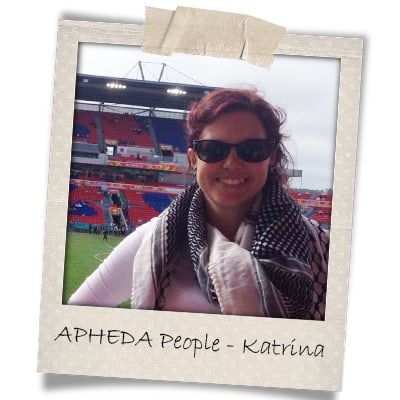Union Aid Abroad-APHEDA People: Meet Katrina
Union Aid Abroad-APHEDA is about people – people working together to make things better for all. As the global justice organisation of the Australian union movement, each and every APHEDA supporter, member, partner, activist and participant here in Australia and all around the world contributes to the work it takes to tackle inequality and injustice.
Meet Katrina.
This month we introduce you to Katrina Byrne. Katrina is an organiser with the Community and Public Sector, working with members in public service agencies like the Department of Immigration & Border Protection.
What does it meant to be union to you?
KB: Being union to me is about solidarity and standing together with workers – both your colleagues and the extended community. It’s about building stronger and safer communities for ourselves and our kids (Ed: in the background, Katrina’s baby Finn gurgles in agreement).
What does it meant to be APHEDA to you?
KB: To be APHEDA is to support workers across the globe and empower them to fight for better conditions. Being APHEDA is especially about helping those who are most disenfranchised across the globe.
Why do you think it’s important for APHEDA to grow its membership base, those contributing monthly to the work, to 20,000 people by 2025?
KB: There’s two main reasons it’s important for APHEDA to continue to grow. First, there’s been massive cuts to Australian government funding for aid. Secondly, because it’s important for union members not only to focus on what’s happening here in Australia but what’s happening in other countries – our campaigns and fights have a lot in common!
What part of your work are you most connected to/proud of? Why?
KB: I’m particularly proud of the work that APHEDA does in the Occupied Palestinian Territories and in Lebanon with Palestinian communities – especially after hearing Helen McCue’s stories about the inception of APHEDA. (Ed: you can read more about this in Livelihoods & Liberation Struggles: 30 Years of Australian Worker Solidarity)
What do you see as the work (areas, issues, etc.) that is most important for APHEDA to focus on in the future?
KB: APHEDA’s continued focus on projects that support women will remain important this century as we continue to fight for equality!
When you have one-on-one conversations with people about APHEDA, how do you describe APHEDA’s work? Why would you recommend they join APHEDA?
KB: By joining APHEDA, you support work around the world that gives people the skills to make change in their workplaces and their communities. I also mention that APHEDA has incredibly low administration costs and that money flows directly from Australian workers to other workers! If all else fails, baked goods are a good bribe.

